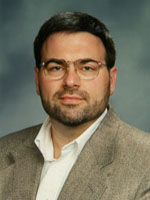
Anthony Czarnik
University of Nevada at Reno
Desperately Seeking Electric Fans
Somehow I managed to miss all notice of the Gordon Re-search Conferences as a graduate student and postdoctoral fellow. In retrospect, it is hard to imagine how that could have happened. I suppose I missed the meeting announcements because I had given up my subscription to
Science. In any case, in 1983, when I became an assistant professor of chemistry at Ohio State University, my friends David Hart and Matt Platz told me that the meetings were great. I think David helped get me an invitation to speak at the 1984 Medicinal Chemistry GRC at Colby-Sawyer College in New Hampshire.
I was enormously excited to have the opportunity to give my first major presentation to a group of such well-known chemists. The whole experience–perhaps excluding the heat and the fact that I lacked a fan in my room–was wonderful. I soon became a regular attendee at the Bioorganic Chemistry GRC. Every meeting was valuable: the good talks were stimulating, and even the talks I found less interesting provided time to let my mind wander.
At one Bioorganic Chemistry meeting in the mid-1990s I found myself in a discussion with several other attendees about one of my pet peeves–why cell biologists who needed fluorescent indicators for intracellular analytes did not seem to be aware of the work being done by chemists who were synthesizing them. This conversation led directly to my venting in the journal
Chemistry and Biology. I wrote a piece titled “Desperately Seeking Sensors” in twenty-four hours; as it turns out, it is still one of my most cited papers.
I attended the Bioorganic Chemistry conferences long enough to be elected chair for the 1997 meeting, a duty I shared with John Griffin. I was so proud to have had the opportunity to co-organize a meeting; I really felt I was giving back to a conference that had given me so much.
In early 1998 GRC management put out a call for proposals for new meetings that might draw attendance by more industrial scientists. Early Gibson Island Research Conferences organized by Neil Gordon brought together many industrial chemists who could, by signing nondisclosure agreements, talk about the problems in their current research projects and get help solving them. Over the years academics had come to make up a larger and larger percentage of attendees, presenters, and organizers. Thus, initiating a few new meetings that spoke to industrial science as in Gordon’s time seemed like an excellent idea.
I had just been selected as the editor for the American Chemical Society’s new
Journal of Combinatorial Chemistry, and I was confident that combinatorial chemistry was the kind of topic GRC management had in mind. Hervé Bouchard felt the same way and had submitted a similar proposal; so Hervé and I served as cochairs of the first Combinatorial Chemistry (CC) GRC in 1999. I worked extremely hard to raise money for the meeting (starting a meeting from scratch felt like a huge responsibility). My instinct told me that companies would perceive the relevance of the Combinatorial Chemistry Conference to their own operations in medicinal chemistry, and I was proved correct. We were supported generously (which was fortunate, because I was able to purchase three large fans for the poster room to give relief from the beastly heat that summer at the Tilton School in Tilton, New Hampshire;
I later donated the fans to the school as a “thank you” for hosting us that week.) The meeting was oversubscribed and was such a success that Carlyle Storm suggested we start meeting annually, on the condition that we agree to meet in 2000 at the site in Il Ciocco, Italy. With little to no persuasion required, the attendees voted a resounding “yes!” By alternating between U.S. and European sites, the Combinatorial Chemistry Conference has managed to retain high levels of interest from chemists on both sides of the Atlantic.
Perhaps because things had gone so well for the first Combinatorial Chemistry Conference, I was invited to serve as a member of the GRC Selection and Scheduling Committee starting in 2000. I have found that being a part of the group that makes life-and-death decisions for meetings is a heavy, but essential, charge: meetings must change as emphases in science change. Attending annual meetings with Carlyle, Nancy Ryan Gray, and the twenty or so scientists committed to preserving the unique atmosphere of GRC meetings has been a privilege. This group takes every aspect of the Gordon Conferences seriously, and discussions, even when heated, are always respectful. GRC is a great organization supported by a dedicated staff, and it deserves to be sustained by all who have reaped its many benefits.